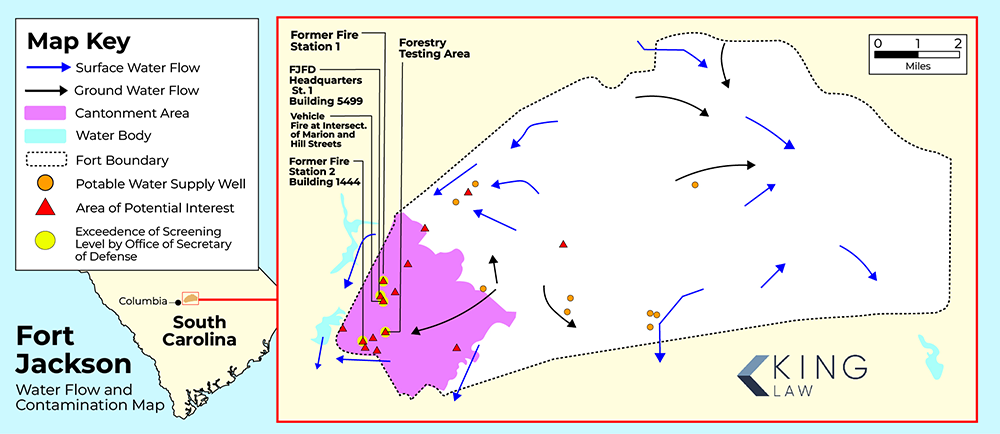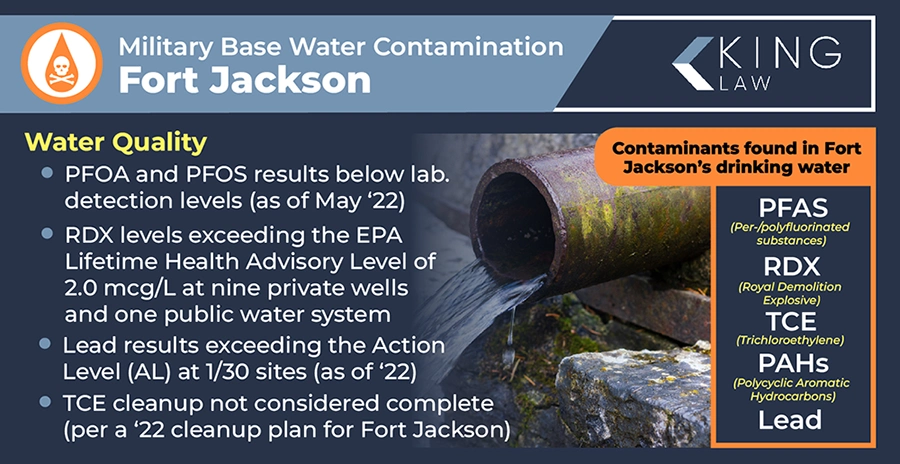
Fort Jackson Water Contamination Lawsuit Overview
Named after President Andrew Jackson, Fort Jackson was established in 1917 to train those in the 30th and 81st Infantry Divisions. It continued to be a training hub for the South Carolina National Guard from 1925 to 1940, became an Army garrison in 1940, and was designated as a U.S. Army Training Center in 1973 after playing an instrumental role in training soldiers during World War II and the Korean War. Fort Jackson continued to expand and is now considered one of the largest and most active training facilities, supporting training for 50% of new U.S. Army soldiers each year.
With Fort Jackson’s history comes long-standing issues with water contamination. It is now a designated Superfund site with efforts focused on ridding the area of contaminants that pose a risk to human health. Known contaminants in drinking water at Fort Jackson include royal demolition explosive (RDX), trichloroethylene (TCE), polycyclic aromatic hydrocarbons (PAHs), lead, and per- and polyfluoroalkyl substances (PFAS). Exposure to these chemicals can cause serious medical conditions including testicular cancer, kidney cancer, bladder cancer, thyroid cancer, and thyroid disease, among others. Those affected by these contamination-related illnesses can now file a lawsuit for potential compensation after spending time at or near the Fort Jackson base.
Fort Jackson Water Contamination Lawsuit Updates
Updates continue to unfold as more and more people are affected by water contamination at Fort Jackson and other military bases:
February 2024 – More Claimants File Fort Jackson Water Contamination Lawsuits
Veterans and military members continue to file water contamination claims after developing symptoms and illnesses after toxic exposure. Others who may be eligible include family members and people who live near Fort Jackson or another affected base.
April 2022 – Water Contamination Data Sparks Legal Action From Affected Military Members
A government study reveals widespread water contamination at multiple military bases. Listed contaminants are known to cause a series of short-term and life-threatening long-term conditions. As a result, those who were stationed at Fort Jackson and other affected bases began to pursue legal action.
September 2022 – Army Cleanup Program Calls Out Multiple Contaminants Including TCE and PAHs
September 2022 Fort Jackson Army Cleanup Program documentation specifies cleanup efforts involving PFAS and additional contaminants, including TCE and PAH. Contaminated soil and groundwater are a concern because they impact the water people use to drink, cook, shower, and more. The U.S. Army website specifies the next testing of Fort Jackson water as June 2023, which has passed without a published update.
April 2022 – DoD Study Reveals Additional Chemicals Contaminating Fort Jackson Water
The Department of Defense (DoD) released a study in 2022 showing that 116 military installations were affected by potentially unsafe levels of toxins in their drinking water. One of the bases listed in their report was Fort Jackson with recognized levels of PFAS, also known as forever chemicals.
2013-2019 – Public Meetings and Well Sampling Continue to Determine Extent of Fort Jackson Water Contamination
Public meetings continued to discuss water contaminants at Fort Jackson and their potential health implications. Sampling was done throughout residential wells and officials began creating proposals and plans for remediation.
2009-2013 – Testing Reveals Groundwater Contamination at Fort Jackson
Operational Range Assessments (ORAP) confirmed RDX, a chemical used in grenades and other explosives, in the surface water and groundwater east of Weston Lake. While RDX isn’t explosive in water, it poses serious health risks when consumed.
On this page:
Fort Jackson Water Contamination Lawsuit Overview
Fort Jackson Water Contamination Lawsuit Updates
Historical Background of Toxic Exposure at Fort Jackson
Fort Jackson Water Contamination Map
Contaminants Found in Fort Jackson’s Drinking Water
Current Water Quality at Fort Jackson
Health Risks and Symptoms Linked to Drinking Water at Fort Jackson
Eligibility Criteria for Fort Jackson Water Contamination Lawsuit
Fort Jackson Water Contamination Settlement and Payout Amounts
How to File a Fort Jackson Water Contamination Lawsuit
Water Contamination at Fort Jackson – Historical Background of Toxic Exposure
Identified use of chemicals like RDX at Fort Jackson dates back to the 1950s. Since then, contamination concerns have grown, particularly with the water those on base are using daily. Since the discovery of RDX in groundwater, additional chemicals have been identified including TCE, PAHs, and PFAS.
Fort Jackson Water Contamination Map

Reference the above map for information regarding the location and spread of contamination at Fort Jackson. Keep in mind that more than 3,500 soldiers and an additional 12,000 family members live at Fort Jackson and are susceptible to drinking water concerns.
Contaminants Found in Fort Jackson’s Drinking Water
There are multiple chemicals found in Fort Jackson water testing that pose a risk to human health. PFAS, RDX, lead, TCE, and PAHs are among these chemicals.
PFAS: Per- and Polyfluorinated Substances
PFAS contamination largely relates to the use of firefighting foam (AFFF) during training exercises, which occurred at Fort Jackson. These chemicals accumulate in groundwater and soil, affecting drinking water. Studies have shown clear connections between PFAS and immune system dysfunction, hormonal disruptions, thyroid disease such as hyperthyroidism or hypothyroidism, ulcerative colitis, and multiple cancers including kidney cancer, testicular cancer, bladder cancer and thyroid cancer.
RDX: Royal Demolition Explosive
RDX is an explosive compound that has been used by the military since the 1950s, particularly in items like hand grenades and other artillery shells. Areas susceptible to RDX contamination include where explosives were manufactured, used in training, and disposed of. When RDX enters the soil and groundwater, individuals on base are at risk of consuming the explosive and facing issues like neurological disorders, liver damage, kidney damage, and developmental concerns. These concerns primarily arose and started to grow when Fort Jackson wells tested positive for RDX in December 2013.
Lead
Fort Jackson drinking water testing revealed levels of lead that exceeded South Carolina Department of Health and Environmental Control (SCDHE) standards. Lead is a heavy metal that can enter groundwater from military activities like facility maintenance and ammunition use. Even low levels of lead exposure can cause short- and long-term impacts, so those stationed at Fort Jackson are at risk of serious health concerns including kidney damage and impaired blood cell function.
TCE: Trichloroethylene
Trichloroethylene has been used in the military for cleaning, degreasing, and maintaining weapons and machinery. Cleanup efforts at Fort Jackson have focused on lowering levels of TCE through various chlorination processes. Those who consume TCE-contaminated drinking water risk symptoms like dizziness, headaches, confusion, nausea, liver damage, and life-threatening conditions.
PAHs: Polycyclic Aromatic Hydrocarbons
Fort Jackson groundwater and soil also tested positive for elevated levels of PAHs. PAHs can generate extreme heat and smoke, and have been used in military explosives and smoke-producing items. These chemicals can cause a series of short-term complications like nausea, vomiting, confusion, diarrhea, and eye irritation. Those affected at Fort Jackson may also experience long-term problems like kidney damage, liver damage, jaundice, and vision problems.
Current Water Quality at Fort Jackson
The U.S. Army asserts that Fort Jackson drinking water meets safety standards. While publicly available updated test results are limited, recent findings include:
- PFOA and PFOS results below laboratory detection levels (as of May 2022)
- RDX levels exceeding the EPA Lifetime Health Advisory Level (HAL) of 2.0 micrograms per liter at nine private drinking water wells and one public water system (per an April 2023 proposed plan)
- Lead results exceeding the Action Level (AL) at 1/30 sites (as of 2022 water testing results)
- TCE cleanup not considered complete (per a 2022 cleanup plan for Fort Jackson)

Water Treatment Efforts at Fort Jackson
The United States Army conducts regular testing to monitor for PFAS, RDX, and other contaminants in drinking water. They follow EPA Lifetime Health Advisory Level (HAL) guidelines and Safe Drinking Water Act standards when determining what requires remediation. Monitoring focuses on wells throughout the base and has been able to detect trace amounts of RDX, particularly in the southern portion of Fort Jackson.
Fort Jackson and the South Carolina National Guard participate in an Operational Range Assessment Program (ORAP) to assess the potential migration of ammunition chemicals from ranges. Public meetings also allow residents and affected communities to comment on proposed plans and sample findings. Whole-house filtration systems have also been provided to residents with RDX levels above EPA’s HAL.
Investigations have also taken place to confirm the source of RDX and other chemical contamination. This has taken soil samples, water samples, and historical records into account with the incorporation of well installations. Findings have deemed historical military training activities as the likely source of RDX and PFAS contamination, helping determine remediation plans.
Health Risks and Symptoms Linked to Fort Jackson’s Drinking Water
Based on the multiple contaminants found in Fort Jackson drinking water, affected individuals could face the following illnesses and symptoms:
- Kidney cancer
- Bladder cancer
- Liver cancer
- Thyroid cancer
- Testicular cancer
- Other thyroid diseases
- Ulcerative Colitis
- Kidney or liver damage
- Impaired blood cell function
- Dizziness
- Headaches
- Nausea and vomiting
- Diarrhea
- Neurological disorders
Our law firm is currently evaluating cases where individuals have been diagnosed with:
- Bladder Cancer
- Breast Cancer
- Hodgkin’s Lymphoma
- Kidney Cancer
- Leukemia
- Liver cancer
- Multiple-Myeloma
- Non-Hodgkin’s Lymphoma
- Pancreatic Cancer
- Prostate Cancer
- Testicular Cancer
- Thyroid Cancer
- Thyroid Disease
- Ulcerative Colitis
It’s crucial to connect with a medical professional and share information about your exposure. Early testing and screening can help detect health issues and begin treatment as soon as possible.
Eligibility Criteria for Fort Jackson Water Contamination Lawsuit
If you have been diagnosed with an illness related to contaminated drinking water at Fort Jackson, you could be eligible for compensation. Our team can review your case, advise if you should pursue legal action, and help you understand how much your case may be worth. To confirm you’re eligibility, we’ll look at:
1. Duration of exposure: How long you were exposed to contamination is a crucial factor in building toxic exposure and water contamination lawsuits. Toxic exposure is never good for your health but toxic chemicals like PFAS tend to build up in the body, creating an increased risk. We are typically looking for at least six months of exposure to toxins for a strong case.
2. Diagnosis: Our law firm is currently evaluating cases where individuals have been diagnosed with:
- Bladder Cancer
- Breast Cancer
- Hodgkin’s Lymphoma
- Kidney Cancer
- Leukemia
- Liver cancer
- Multiple-Myeloma
- Non-Hodgkin’s Lymphoma
- Pancreatic Cancer
- Prostate Cancer
- Testicular Cancer
- Thyroid Cancer
- Thyroid Disease
- Ulcerative Colitis
Thousands of drinking water contamination legal claims are being filed across the country. It is believed that these cases and those against PFAS-containing product manufacturers can result in multi-million dollar settlements.
To file a military water contamination lawsuit, you must consult with an attorney. This will allow you to provide important evidence, such as medical records, military directives, and discharge paperwork to build your case. Strive to provide as much information related to your condition and your service as possible to boost your chances of a successful claim. Water contamination lawsuits can take several months or longer to resolve, but rest assured that an attorney can help you understand the process and timing.
Fort Jackson Water Contamination Settlement and Payout Amounts
Our firm anticipates Fort Jackson water contamination settlements potentially ranging from $30,000 to $500,000, depending on the circumstances of each case. Average settlements could land around $250,000. Actual Fort Jackson water contamination payouts can depend on factors like age at the time of diagnosis, duration of exposure, type of illness, and amount of supporting evidence.
Eligible claimants will likely have the option of reaching a settlement or going to trial. Trial verdicts often have a higher payout than settlements though they risk the result of no compensation at all. It’s best to discuss with an experienced attorney to understand your compensation potential.
How to File a Fort Jackson Water Contamination Lawsuit
To file a Fort Jackson water contamination lawsuit, you should:
- Reach out to an attorney experienced in environmental law and toxic torts, such as those at King Law.
- As your attorney guides you through the process, help them gather all requested evidence, including medical records showing your health issues related to water contamination, military records showing you were stationed at Fort Jackson, and other evidence of contamination and associated health risks.
- Your attorney will draft your complaint and file it with the appropriate court, outlining the details of your case and the party you feel is responsible for your toxic exposure.
- Your attorney will help you reach a settlement or may advise going to trial, leveraging your support as needed to work toward the best possible outcome.
- In an ideal scenario, you will achieve a settlement and gain compensation for your Fort Jackson water contamination claim.
Evidence to Support Your Claim:
To build a successful legal claim as a result of Fort Jackson water contamination, you’ll typically need:
- Medical records confirming your diagnosis related to water contamination
- Records detailing your prognosis and recommended treatment plan
- Military orders, deployment records, discharge paperwork, and any other proof of your time at Fort Jackson during periods of contamination
- Reports and studies detailing the toxins found in Fort Jackson and related health conditions
- Additional reports or testimonies advised by your attorney
Lack of evidence, particularly around your time at Fort Jackson and related illness, could complicate your chances at establishing a successful case. Reaching out to an attorney is crucial to determine your eligibility and to get started with the legal process as soon as possible.
Contact a Fort Jackson Water Contamination Lawyer
King Law attorneys are experienced in environmental law and military-related litigation, allowing us to offer exemplary advocacy for those affected by water contamination during their time of service. We understand the toxins that have affected members of the military and their families and know what it takes to build the strongest case possible. We’re prepared to guide you through each stage of the process with compassion and dedication to get you the compensation you’re entitled to.
Frequently Asked Questions (FAQs)
For additional information about Fort Jackson water contamination, read additional questions and answers below.

